Every day; every day and even every night, there is controversy on the news. Those of us who feel called to be good citizens and have convictions about things – even mild convictions about a few things – can get riled up in a heartbeat. It’s exhausting, making us cranky and tense. It is bad for our relationships, maybe even our souls. Of course, there is plenty we ought to be concerned about. But it’s hard.
Part of it is the 24/7 news cycle which shows important, even tragic, news events in detailed ways that make it hard for even the most tender hearts among us to keep from getting jaded or overwhelmed from the info-glut, leading to what some call “compassion fatigue.” Neil Postman wrote about this in Amusing Ourselves to Death decades ago, how we are barraged with stories about floods and famines between commercials for hemorrhoids; today it may be stories of torture or children in cages and ads for Viagra, disturbing and banal. We hear a lot and we are on edge.
Some of it is how we come to experience bad behavior as normal – well dressed, supposedly well-informed people on TV yelling at and over each other, mocking each other, insisting on their self-righteous certainty. These pundits on the panels are paid to be boisterous and prideful. Sooner or later, their style of discourse rubs off; it’s a new normal and seems so commonplace we no longer notice unhealthy it is.
Short of opting out, it is hard to get some distance and maintain our virtue when we see awful stuff and then watch people yelling about it. Beth and I don’t do cable so I only have seen this stuff in snatches but the other day I tuned in to some local right wing talk radio and heard two well-known political shock jocks and I could hardly believe my ears, how rude and vulgar and hostile they were, spewing anger about “libtards” and such. (At least the reprehensible Michael Savage has a name well suited for his nasty demeanor.) It was heart breaking and alarming to think some of our customers and neighbors like this immoral propaganda.
And, of course, let’s say it: our current President invites howls of protest in a way that previous Presidents of previous administrations in our lifetime (Republican or Democrat) never have. He knows so little and says so much that is just baldly wrong, and says it so poorly. I’ve lived through Watergate and the Iran-Contra scandal and followed my acquaintance Ken Starr when he prosecuted Clinton over the Whitewater corruption, which revealed the gross Monica Lewinsky situation. I’ve campaigned against Democrats like Janet Reno for their bad asylum policies and Republicans for their disregard of environmental legislation. I’ve protested Jimmy Carter (almost face to face) over militarism and opposed Obama’s support of partial birth abortions. But even in what I considered horrific policy injustices – Reagan shifting to a “first strike” posture re-aiming our nuclear weapons and thereby threatening to start a nuclear holocaust, his bloody mass murder of civilians in El Salvador and Nicaragua, some of Obama’s bail outs of big businesses or nearly everybody’s bi-partisan decision to attack Iraq, just for instance — those Presidents could make a decent case for their policies which I opposed. They could engage in meaningful argument about why these terrible matters were necessary and, it seems, they at least entertained their opposition with good faith conversations and even, on occasion, some compelling nuance as they tried to persuade their opponents across the aisle.
Politics is often messy and debate can be vigorous, but in those past decades it wasn’t quite as laden with the sort of nearly nihilistic, battle-ready, partisan polarization we see now. Things got ugly during the 1980s during the Bork judicial nominations, for instance. The Clarence Thomas thing was really consequential. The hard left started getting nearly deranged about Bush after the WMD fiasco in Iraq and the alt right grew to hate Hillary in a way that seemed sometimes unhinged. As a candidate Trump was scandalous in adding to the fear-mongering “birther” movement. Scholars are still trying to figure out when these socio-political culture wars ramped up to where we are now. The hostility shown now in our current era is certainly not the cause, but a symptom, or so many think.)
 We used to complain about gridlock and the lack of civility. Now we have a left wing guy shooting Republican congress-people while they are playing baseball. And lefty feminista politicians get vile rape threats almost daily. Helping fuel this ugliness we have a President who cannot be civil because he can’t follow the plain Bible command to tame his tongue. Or his twitching, tweeting, fingers. We elected a man who said he was proud about his greed and who exhibits traits of narcissism, a self-professed sexual abuser and then some fundamentalist Christians circled the wagons around him, saying he gets a “mulligan.” In response many others grow more and more angry. Both sides accuse the others of holding to double standards. (Thanks to PennLive for the cartoon.) It seems to me that nobody should be happy with how things are these days.
We used to complain about gridlock and the lack of civility. Now we have a left wing guy shooting Republican congress-people while they are playing baseball. And lefty feminista politicians get vile rape threats almost daily. Helping fuel this ugliness we have a President who cannot be civil because he can’t follow the plain Bible command to tame his tongue. Or his twitching, tweeting, fingers. We elected a man who said he was proud about his greed and who exhibits traits of narcissism, a self-professed sexual abuser and then some fundamentalist Christians circled the wagons around him, saying he gets a “mulligan.” In response many others grow more and more angry. Both sides accuse the others of holding to double standards. (Thanks to PennLive for the cartoon.) It seems to me that nobody should be happy with how things are these days.
I want to suggest some recent books on civility that are very good that give us some guidance about how we might move out of this morass. But since I’m in the thick of it here, I might as well first share another thought about our current civic situation. I’m trying to be a bit candid here, so trust our customers and BookNotes readers won’t mind.
THERE ARE TWO TYPES OF TRUMP SUPPORTERS I SORT OF APPRECIATE
A first step towards civility is at least some kind of understanding of, maybe even a bit of appreciation for the views of others. That is, we each have caricatures and assume the worst of others, which is a violation of the Golden Rule. We should try to give others the benefit of the doubt. At the very least, disagree as we may, we should search for some sense of understanding with those with whom we disagree. Find something admirable in their stance.
There are two sorts of folks that support Mr. Trump whose motivations or logic I think understand, even if I vigorously oppose them. There are folks, including friends of mine and customers of ours, who are under no illusion that Mr. Trump is a good man or a good leader. They know the White House is a mess, our diplomacy a hot mess, and the President himself a bad individual. But they think it is worth putting up with these notable problems in order to get a few key pieces of legislation or judicial appointments in place. As a Christian, I do not condone this “ends justifies the means” pragmatism, but I get it. They hold their nose and do what they think is best, supporting what they might call the lesser of two evils. I can respect that, or at least try to, and ought to remember to realize that these friends hold certain principles dear for the sake of the common good. They are so eager to see those goods enacted, they are willing to get into the mud by offering a qualified sort of partnership with an unsavory businessman turned politico. They have weighed their options and are trying to do the right thing and for that I salute them.
The others whose support for Mr. Trump I think I at least somewhat appreciate are those who see themselves as true believers, those whose populist ideology is almost, ironically, Marxist or Maoist in its use of blunt force to accomplish goals “by any means necessary.” How odd it is to hear self-proclaimed rednecks and patriots, usually poorer white folks, citing Malcolm X. This alt right worldview believes in disrupting things, rattling the cages, draining the swamp. They relish Trump’s chaos, his bad speeches, his dishonesty, his vulgarity. It’s all part of their strategy, such as it is, and they see this as a way to stick it to the (elitist) Man. Like their left-wing/counter-cultural forebears from the 1960s, they take a page from the playbook of community organizer Saul Alinsky (who they so loudly criticized just a few years back when it became known that Obama was an Alinksy-trained community organizer in the inner city of Chicago before he got involved in electoral politics.) They love it that the current President “tells it like it is” even though, of course, he doesn’t. They love the appearance of being revolutionary with their “Don’t Tread On Me” flags — “Power to the People” they shout, as did the violent revolutionaries of the ‘60s like SDS and the Weather Underground. I can appreciate anyone who cares deeply enough about anything to want to man the barricades, so good for them. I have spent enough time with far left activists on the picket lines to both appreciate the commitment of such true believers, and to greatly fear this kind of hard-ball ideology gone amuck.
So. The 24/7 media doesn’t help but the President himself causes some of our angst with his contradictory statements and vicious tweets and chaotic policy. Then, those who over-react against his populist supporters for overlooking this weirdness naturally make it worse. Everybody holds the others in contempt. I know. I suppose I’m an NPR sort of guy – tilting left but trying to be fair with some degree of nuance, considering various angles – and can’t imagine what it’s like to have one’s political views, postures, and attitudes so decisively shaped by the biased one-sidedness of Fox News or MSNBC. But there we are.
DEVELOPING A CHRISTIAN VIEW OF POLITIC AND PUBLIC LIFE
I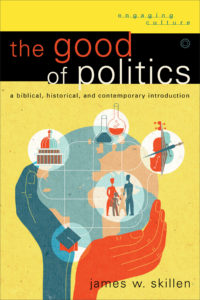 ’ve written much, before, here at BookNotes, about developing a uniquely Christian worldview that funds a distinctively Christian approach to politics. Before we get to the topic of civility and the fraying of our culture and perhaps our Republic, I want to remind us about this. See here, here, or here. I recommend books like James Skillen’s The Good of Politics: A Biblical, Historical, and Contemporary Introduction (Baker Academic; $24.00) which documents a healthy, truly Biblical perspective on the nature of the state and a Christian view of law, government, civil society and public life, including much about how throughout the history of the church key theologians and leaders have gotten this sometimes right and sometimes wrong.
’ve written much, before, here at BookNotes, about developing a uniquely Christian worldview that funds a distinctively Christian approach to politics. Before we get to the topic of civility and the fraying of our culture and perhaps our Republic, I want to remind us about this. See here, here, or here. I recommend books like James Skillen’s The Good of Politics: A Biblical, Historical, and Contemporary Introduction (Baker Academic; $24.00) which documents a healthy, truly Biblical perspective on the nature of the state and a Christian view of law, government, civil society and public life, including much about how throughout the history of the church key theologians and leaders have gotten this sometimes right and sometimes wrong.
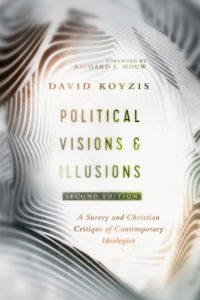
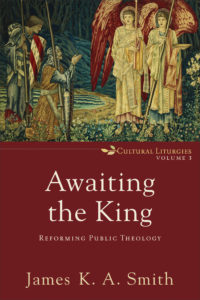 Heady stuff like Political Visions & Illusions: A Survey & Christian Critique of Contemporary Ideologies (now out in an important second edition) by David Koyzis (IVP Academic; $33.00) critiques the ideologies of the left and the right and the roots of their pagan, Enlightenment-era political philosophies. What a powerful, important read — vital for the serious-minded Christian citizen. Similarly, James K.A. Smith’s third volume in his must-read, if demanding, “Cultural Liturgies” trilogy, Awaiting the King: Reforming Public Theology (Baker Academic; $22.99) is, again, intellectually robust but very, very important. I reviewed it here – do check it out. Maybe these books aren’t for everyone but thought leaders, anyone thinking about civic life, about public faith really should be grappling with this non-partisan, third way stuff.
Heady stuff like Political Visions & Illusions: A Survey & Christian Critique of Contemporary Ideologies (now out in an important second edition) by David Koyzis (IVP Academic; $33.00) critiques the ideologies of the left and the right and the roots of their pagan, Enlightenment-era political philosophies. What a powerful, important read — vital for the serious-minded Christian citizen. Similarly, James K.A. Smith’s third volume in his must-read, if demanding, “Cultural Liturgies” trilogy, Awaiting the King: Reforming Public Theology (Baker Academic; $22.99) is, again, intellectually robust but very, very important. I reviewed it here – do check it out. Maybe these books aren’t for everyone but thought leaders, anyone thinking about civic life, about public faith really should be grappling with this non-partisan, third way stuff.

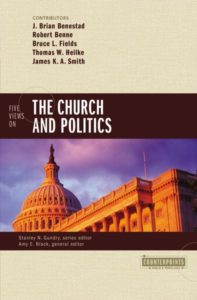 We have recommended the fascinating five-views across the spectrum dialogue expertly edited by P.C. Kemeny called Church, State and Public Justice: Five Views (IVP Academic; $22.00) and the more recent five-fold back and forth in the Counterpoints series dialogue in Five Views on the Church and Politics edited by the wonderful Amy Black (Zondervan; $19.99.) Whenever I mention this I rave about Jamie Smith’s helpful contribution not only offering a Kuyperian type neo-Calvinist pluralistic approach, but in his ecumenically astute feedback after the other chapters a Lutheran, an Anabaptist, a Roman Catholic, and a historic, black church approach.
We have recommended the fascinating five-views across the spectrum dialogue expertly edited by P.C. Kemeny called Church, State and Public Justice: Five Views (IVP Academic; $22.00) and the more recent five-fold back and forth in the Counterpoints series dialogue in Five Views on the Church and Politics edited by the wonderful Amy Black (Zondervan; $19.99.) Whenever I mention this I rave about Jamie Smith’s helpful contribution not only offering a Kuyperian type neo-Calvinist pluralistic approach, but in his ecumenically astute feedback after the other chapters a Lutheran, an Anabaptist, a Roman Catholic, and a historic, black church approach.
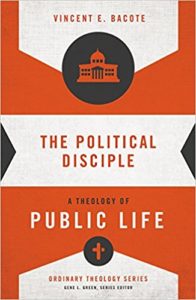 More simple but helpful is Vincent Bacote’s little The Political Disciple: A Theology of Public Life (Zondervan; $11.99) which can persuade the apathetic to care and those accommodated to either party to think a bit more about social holiness and Biblical distinctiveness so that our public witness might be more aligned with Christ’s rule and intent and less partisan. It’s part of a series of nearly pocket-sized called “Ordinary Theology” and is very useful.
More simple but helpful is Vincent Bacote’s little The Political Disciple: A Theology of Public Life (Zondervan; $11.99) which can persuade the apathetic to care and those accommodated to either party to think a bit more about social holiness and Biblical distinctiveness so that our public witness might be more aligned with Christ’s rule and intent and less partisan. It’s part of a series of nearly pocket-sized called “Ordinary Theology” and is very useful.
In under 100 pages, Professor Bacote unpacks four great chapters each starting with a “P” word —
- Permission: Can We Go Out in Public?
- Perspective: Identity and Allegiance
- Posture: Pursuing Public Holiness
- Perseverance: Staying in the Game
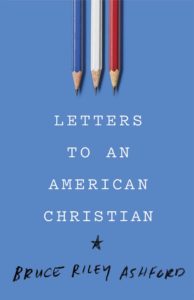 I’m a fan of Bruce Ashford’s small and often delightful Letter to an American Christian (B&H Books; $16.99.) He is a Senior Fellow in Public Theology at the Kirby Laing Institute for Christian Ethics (Cambridge, U.K.) and a Research Fellow at the Ethics and Religious Liberty Commission. He is the co-author of One Nation Under God: A Christian Hope for American Politics, author of Every Square Inch: An Introduction to Cultural Engagement for Christians so he has been bringing his wholistic, if a bit conservative, Christian worldview to bear on public issues for a while, now. This one is especially fun as it is written as a kindly, pastoral letter to a young person who has recently become a Christian but is perplexed about the relationship of faith and public life here in the USA.
I’m a fan of Bruce Ashford’s small and often delightful Letter to an American Christian (B&H Books; $16.99.) He is a Senior Fellow in Public Theology at the Kirby Laing Institute for Christian Ethics (Cambridge, U.K.) and a Research Fellow at the Ethics and Religious Liberty Commission. He is the co-author of One Nation Under God: A Christian Hope for American Politics, author of Every Square Inch: An Introduction to Cultural Engagement for Christians so he has been bringing his wholistic, if a bit conservative, Christian worldview to bear on public issues for a while, now. This one is especially fun as it is written as a kindly, pastoral letter to a young person who has recently become a Christian but is perplexed about the relationship of faith and public life here in the USA.
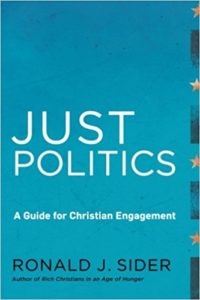 One of the books I think is the very best on all this is Ronald Sider’s meticulous Just Politics: A Guide for Christian Engagement (Brazos Press; $24.00.) It offers a complex template for developing a Biblical worldview, a Christian social theory, a faithful view of political foundations, a batch of policy goals, and then a guide for thinking about detailed issues, policies and advocacy, with due Biblical diligence, theological sophistication, social savvy about realities on the ground. And, always, a good bit of humility since good citizens, even good Christian citizens who have done “all of the above” in getting their ducks in row, can still disagree. Many will disagree with Ron’s conclusions about the Biblical material or the social science data, but no one should criticize his intention to be coherently Christian and informed by good faith, good thinking, and good care for the betterment of society.
One of the books I think is the very best on all this is Ronald Sider’s meticulous Just Politics: A Guide for Christian Engagement (Brazos Press; $24.00.) It offers a complex template for developing a Biblical worldview, a Christian social theory, a faithful view of political foundations, a batch of policy goals, and then a guide for thinking about detailed issues, policies and advocacy, with due Biblical diligence, theological sophistication, social savvy about realities on the ground. And, always, a good bit of humility since good citizens, even good Christian citizens who have done “all of the above” in getting their ducks in row, can still disagree. Many will disagree with Ron’s conclusions about the Biblical material or the social science data, but no one should criticize his intention to be coherently Christian and informed by good faith, good thinking, and good care for the betterment of society.
FORMING HABITS OF CIVILITY – UNCOMMON DECENCY
Alongside the longer project of learning to think faithfully about citizenship and politics as such, and applying it prudently in our complex, pluralistic culture, we also have to do something immediately about how we conduct our conversations and what we can do about the fragmented polarization. We have got to be assertive advocates for better dialogue and less hostility. We have to re-visit the topic of civility.
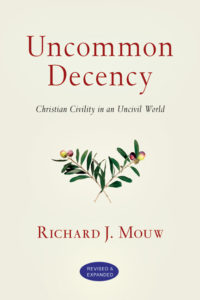 Richard Mouw’s Uncommon Decency: Christian Civility in an Uncivil World (IVP; $18.00) remains the gold standard for me, and I very, very highly recommend his fabulous, small, inspiring book. I know I am not alone in declaring how much I like this book. I’ve written about it in greater detail HERE and would be delighted if you read my review and ordered a bunch. Maybe you could suggest it now as an adult Sunday school class or small group book study for this fall. It’s the best to choose, I think, for a Christian study class or faith formation group or adult ed forum and I explain why in that older BookNotes column.
Richard Mouw’s Uncommon Decency: Christian Civility in an Uncivil World (IVP; $18.00) remains the gold standard for me, and I very, very highly recommend his fabulous, small, inspiring book. I know I am not alone in declaring how much I like this book. I’ve written about it in greater detail HERE and would be delighted if you read my review and ordered a bunch. Maybe you could suggest it now as an adult Sunday school class or small group book study for this fall. It’s the best to choose, I think, for a Christian study class or faith formation group or adult ed forum and I explain why in that older BookNotes column.
Here is a BookNotes refresher on who Dr. Mouw is. His own compelling intellectual memoir, Adventures in Evangelical Civility is reviewed here, and it shows how he models hospitality and grace and convicted civility even in his work as theologian and church leader. I mention Uncommon Decency a bit.
EIGHT RECENT ONES
There are new titles now inviting us to ponder well the current mess we’re in, how to move forward, and what we all might do to understand and reform our current political habits. Complaining about right wing radio and Trump’s dumb tweets and the liberal snowflakes and elites and the mainstream media isn’t enough. These books can help us dig in, understanding the contours of our current context, the nature of the recent threats, getting beyond the nice rhetoric about civility and learning to actually perform the habits of civility.
I’ve already written more than I intended so I’ll try to keep this brief. We have all of these books on sale for 20% off. You can use our secure order form by clicking the link that says “order here” below. Just tell us what want and enter your info. If you are unsure, you can ask us any questions by clicking on the inquiry tab. Or give us call or send us an email at read@heartsandmindsbooks.com
ON SALE – 20% OFF the REGULAR PRICE
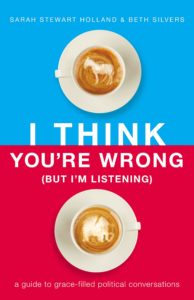 I Think You’re Wrong (But I’m Listening): A Guide to Grace-Filled Political Conversations Sarah Stewart Holland & Beth Silvers (Nelson) $24.99 This is a delightful book, a lovely study that came out of the friendship of these two politically engaged moms with tons of grass-roots civic experience. They know their stuff, have significant disagreements, and have fun talking about them. They famously co-host the “Pantsuit Politics” podcast.
I Think You’re Wrong (But I’m Listening): A Guide to Grace-Filled Political Conversations Sarah Stewart Holland & Beth Silvers (Nelson) $24.99 This is a delightful book, a lovely study that came out of the friendship of these two politically engaged moms with tons of grass-roots civic experience. They know their stuff, have significant disagreements, and have fun talking about them. They famously co-host the “Pantsuit Politics” podcast.
As Jen Hatmaker writes on the back, “Sarah and Beth are an absolute gift to our culture right now.” Book-loving Anne Bogel says it is written especially “for those overwhelmed and exhausted by the current, toxic state of political discourse…” I Think You’re Wrong includes really practical stuff, great stories, good advice about listening well and extending grace. Tsh Oxenreider says this is a “grace filled handbook” for you, “no matter how busy you are, no matter your stage in life.” It is pitched for women, I suppose, but anyone can enjoy it and learn from it. I suppose you realize that one woman tilts red, the other blue. What fun.
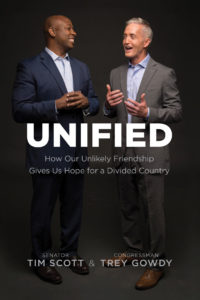 Unified: How Our Unlikely Friendship Gives Us Hope for a Divided Country Senator Tim Scott & Congressman Trey Gowdy (Tyndale) $16.99 What a great little book this is! It is easy to read, co-written by two elected officials – one black, one white, both Republicans — and they are, almost surprisingly in the current climate on Capitol Hill, good friends. This describes how their relationship has allowed them, compelled them, to take each other’s life experiences and views more seriously and with greater good will. For those that long for a story that gives us a glimpse of how to find harmony within diversity, this is a great read.
Unified: How Our Unlikely Friendship Gives Us Hope for a Divided Country Senator Tim Scott & Congressman Trey Gowdy (Tyndale) $16.99 What a great little book this is! It is easy to read, co-written by two elected officials – one black, one white, both Republicans — and they are, almost surprisingly in the current climate on Capitol Hill, good friends. This describes how their relationship has allowed them, compelled them, to take each other’s life experiences and views more seriously and with greater good will. For those that long for a story that gives us a glimpse of how to find harmony within diversity, this is a great read.
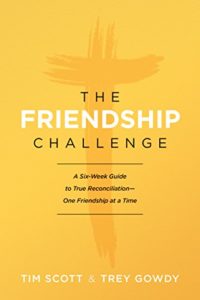 There is a nice companion booklet to Unified called The Friendship Challenge: A Six Week Guide to True Reconciliation – One Friendship at a Time (Tyndale; $12.99) which enables you to work for greater unity in your own community. Grab some friends and work through this together. Here is a little 8 minute video that describe their book, their “Friendship Challenge” and what you can do to build bridges, especially around racial and political differences.
There is a nice companion booklet to Unified called The Friendship Challenge: A Six Week Guide to True Reconciliation – One Friendship at a Time (Tyndale; $12.99) which enables you to work for greater unity in your own community. Grab some friends and work through this together. Here is a little 8 minute video that describe their book, their “Friendship Challenge” and what you can do to build bridges, especially around racial and political differences.
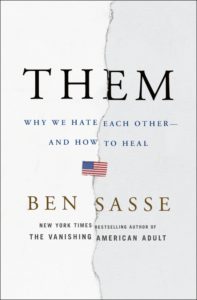 Them: Why We Hate Each Other – And How to Heal Ben Sasse (St. Martin’s Press) $28.99 I hope you know the fabulous books by Senator Ben Sasse. Agree or not with his principled, mid-Western conservatism (and his rather incongruous voting history) his books are fantastic to read. He is a thoughtful, well-spoken, multi-faceted civic leader, less concerned, it seems, about politics as such and more about cultural renewal and civil society. His book The Vanishing American Adult: Our Coming-Of-Age Crisis–And How to Rebuild a Culture of Self-Reliance (St. Martin’s Press; now out in paperback for $17.99) was about problems with the rising generation, or, I might say, with how older Americans have raised and perhaps coddled Gen Z. He invites self-sufficiency, wide reading, consideration of things that matter, local loyalties, family ties, and the like. It’s smart and not condescending.
Them: Why We Hate Each Other – And How to Heal Ben Sasse (St. Martin’s Press) $28.99 I hope you know the fabulous books by Senator Ben Sasse. Agree or not with his principled, mid-Western conservatism (and his rather incongruous voting history) his books are fantastic to read. He is a thoughtful, well-spoken, multi-faceted civic leader, less concerned, it seems, about politics as such and more about cultural renewal and civil society. His book The Vanishing American Adult: Our Coming-Of-Age Crisis–And How to Rebuild a Culture of Self-Reliance (St. Martin’s Press; now out in paperback for $17.99) was about problems with the rising generation, or, I might say, with how older Americans have raised and perhaps coddled Gen Z. He invites self-sufficiency, wide reading, consideration of things that matter, local loyalties, family ties, and the like. It’s smart and not condescending.
At any rate, this new one is really important and we recommend it. His Nebraska good sense, and interest in American history is grounded in notable Christian values and convictions, principles and assumptions that shape this book. Also, importantly, he thinks our political problems are not unrelated to our cultural problems, specifically loneliness. He’s right! Erudite, yes, but he offers a plan of action to deepen our commitments to good conversation, bolstering notions of free speech and good listening, resisting crass partisanship and moving us towards a better culture and glimpses of social healing.
Listen to these really good endorsements that grace the back of this good book:
“Mr. Sasse’s experience as a senator in a time of hyperpartisanship gives his analysis a special poignancy… [his] remedies are wise and well-expressed… his prose has a distinctively cheerful warmth throughout. Perhaps at last we have a politician capable of writing a good book rather than having a dull one written for him.” —The Wall Street Journal
“Sasse is highly attuned to the cultural sources of our current discontents and dysfunctions. … Them is not so much a lament for a bygone era as an attempt to diagnose and repair what has led us to this moment of spittle-flecked rage… a step toward healing a hurting nation.” –National Review
“Sasse is an excellent writer, unpretentious, thoughtful, and at times, quite funny … even if you disagree with some or all of what Sasse writes, it’s an interesting book and his arguments are worth reading — as are his warnings about what our country might become.” –NPR
“If Sen. Ben Sasse is right – he has not recently been wrong about anything important – the nation’s most-discussed political problem is entangled with the least-understood public health problem. The political problem is furious partisanship. The public health problem is loneliness. Sasse’s new book argues that Americans are richer, more informed and “connected” than ever – and unhappier, more isolated and less fulfilled.” –George Will, The Washington Post
“Sasse emphasizes the importance of civil debate, denouncing Fox News and MSNBC, and laments the extreme partisanship that characterizes public life in the Trump era. But ‘the dysfunction in D.C., ‘ he says, stems from something ‘deeper than economics, ‘ and ‘deeper and more meaningful’ than politics. ‘What’s wrong with America, then, starts with one uncomfortable word, ‘ he writes. ‘Loneliness.'” —The New York Times
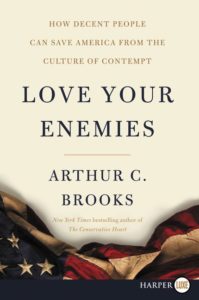 Love Your Enemies: How Decent People Can Save America From the Culture of Contempt Arthur Brooks (Broadside Books) $27.99 Wow, this subtitle alone should capture your attention and inspire you to want to start a book group, right? I have heard Mr. Brooks (no relation to David, by the way) and know him to be kind and eloquent and thoughtful. The New York Times recently reviewed this in their Book Review section which indicates its seriousness and its importance. With great endorsements by Simon Sinek and Ben Sasse, cofounder of AOL Steve Case, and important and eloquent Roman Catholic author, Bishop Robert Barron, you might realize that this will appeal to readers from across the political and religious and cultural spectrum. When he warns us not to “weaponize” the values of others that we disagree with, but to treat them with understanding and respect, he’s speaking boldly and wisely. When he says we have more in common than we realize, he’s surely correct and, as you might guess, I love hearing that good news about common ground and such. (Alas, he seems to almost under-play our most serious differences, though. In fact, some of really don’t have much in common. I appreciate the line from Os Guinness who years ago spoke of learning to live “with our deepest differences.”) Kindness and grace are hugely and urgently needed, but I wished for a bit about the structures and principles of pluralism and how we can actually honor serious diversity and what may seem like impassable conflict.
Love Your Enemies: How Decent People Can Save America From the Culture of Contempt Arthur Brooks (Broadside Books) $27.99 Wow, this subtitle alone should capture your attention and inspire you to want to start a book group, right? I have heard Mr. Brooks (no relation to David, by the way) and know him to be kind and eloquent and thoughtful. The New York Times recently reviewed this in their Book Review section which indicates its seriousness and its importance. With great endorsements by Simon Sinek and Ben Sasse, cofounder of AOL Steve Case, and important and eloquent Roman Catholic author, Bishop Robert Barron, you might realize that this will appeal to readers from across the political and religious and cultural spectrum. When he warns us not to “weaponize” the values of others that we disagree with, but to treat them with understanding and respect, he’s speaking boldly and wisely. When he says we have more in common than we realize, he’s surely correct and, as you might guess, I love hearing that good news about common ground and such. (Alas, he seems to almost under-play our most serious differences, though. In fact, some of really don’t have much in common. I appreciate the line from Os Guinness who years ago spoke of learning to live “with our deepest differences.”) Kindness and grace are hugely and urgently needed, but I wished for a bit about the structures and principles of pluralism and how we can actually honor serious diversity and what may seem like impassable conflict.
Still, Love Your Enemies offers a grand proposal, warm-hearted and witty, patriotic but not ideological. It is a great read, and helps us learn to “disagree without being disagreeable” as the old saying goes. Can the sorts of values and virtues that shape decent folks actually play a role in the hard-scrapple world of legislation and activism? Can we be kind in our Facebook debates and still be taken seriously? Can we set aside our increasingly toxic contempt? These are really important questions and you will be a better person, I’m sure of it, by spending some time with this inspiring book.
Listen to what the brilliant and often goofy Jonah Goldberg, author of the not so zippy, important and complex Suicide of the West says:
Arthur Brooks is a…former French horn player who decided to be an egghead late in life, he is a unique mix of Catholic piety, data obsession, sartorial connoisseurism, physical fitness, old-soul wisdom, and basic decency.
I wanted to note this, too. Again, I love this “love your enemies” stuff and need to, myself, take this advice to heart, daily. But, of course, this does not mean we must curtail our serious critique or our big-picture evaluations. We can be forthright about our disagreements. To wit, it is worth noting the “Letter to the Editor” that appeared in the New York Times Book Review the week after Mr. Brooks’s Love Your Neighbor received a glowing review there written by none other than Ralph Nader (himself an author of a lovely book that includes some homespun profundity about taking care of each other and building a more civil society. See his wonderful memoir, The Seventeen Traditions: Lessons from an American Childhood (Harper; $13.99.)) In that July 5, 2019 Letter to the Editor, Mr. Nader suggested that Brooks’s own right wing think-tank and advocacy organization (the American Enterprise Institute) has itself created some of the current hostility and contempt in our society as it has for decades been bombastic and tireless in resisting compromise and has helped dismantle a more congenial sort of politics, advocating for things that Nader claims have been detrimental to civil society. Nader isn’t the only one suggesting that as noble as Mr. Brooks’s book sounds, his own policy work in DC hasn’t quite gotten the message.
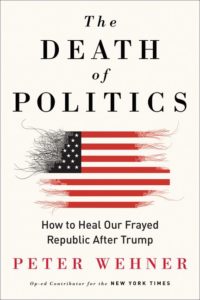 The Death of Politics: How to Heal Our Frayed Republic After Trump Peter Wehner (HarperCollins) $25.99 This book is powerful, unrelenting, nuanced, very well-written, even elegant, and mostly right, I think. Peter Wehner worked in the Reagan White House, served President Bush, and is one of those who, we might say, helped craft the ‘80s itineration of the religious right, at least the more intellectually sound corners of that movement. Almost a decade ago he co-wrote a book with the “compassionate conservative” Michael Gerson, Wheaton grad, Bush speechwriter, now an anti-Trump, Republican Washington Post columnist. That short book which of course we continue to stock was called City of Man: Religion and Politics in a New Era (Moody Press; $19.99) and was wise, balanced, reasonable. Mr. Wehner works at the brainy, principled, conservative, think-tank The Ethics and Public Policy Center, has written for The Atlantic and is a contributing editor to the The New York Times. I say all this to add weight to this incisive study of our current context and our dysfunctional discourse and bad views of government, politics and the use of power, so that you will take seriously his lament and diagnosis, his urgent call for reform and, at least, dignified civility.
The Death of Politics: How to Heal Our Frayed Republic After Trump Peter Wehner (HarperCollins) $25.99 This book is powerful, unrelenting, nuanced, very well-written, even elegant, and mostly right, I think. Peter Wehner worked in the Reagan White House, served President Bush, and is one of those who, we might say, helped craft the ‘80s itineration of the religious right, at least the more intellectually sound corners of that movement. Almost a decade ago he co-wrote a book with the “compassionate conservative” Michael Gerson, Wheaton grad, Bush speechwriter, now an anti-Trump, Republican Washington Post columnist. That short book which of course we continue to stock was called City of Man: Religion and Politics in a New Era (Moody Press; $19.99) and was wise, balanced, reasonable. Mr. Wehner works at the brainy, principled, conservative, think-tank The Ethics and Public Policy Center, has written for The Atlantic and is a contributing editor to the The New York Times. I say all this to add weight to this incisive study of our current context and our dysfunctional discourse and bad views of government, politics and the use of power, so that you will take seriously his lament and diagnosis, his urgent call for reform and, at least, dignified civility.
Like other anti-Trump conservatives, he offers a cry from the heart and a manifesto of the mind, what EPPC scholar and ethicist Mona Charen says is “learned, humane, and wise.” If you tend conservative, you may know Wehner and I’m sure you respect his long service to the thoughtful conservative movement. If you are sour on Trump, you’ll want to read his particular take; it is considerably more profound than the endless partisan snipping from topic-of-the-day CNN pundits. I think this book should have a wide, wide, readership and it think is it very important.
The blurbs on the back are remarkable and remarkably diverse – Jon Meacham, Joe Scarborough, Karl Rove, David Axelrod, John Danforth and evangelical historian, Mark Noll. It is, as Noll describes it, “a conservative’s reasoned indictment of President Trump, a moving appeal for truth-telling, and practical strategies for combining civility with conviction.” I like that one reviewer said he is like “a literary Paul Revere.” Ho! Politics is a noble calling, Wehner insists, and we must recover the dignity of that vocation. More, we need to recover the dignity of our vocation as citizens.
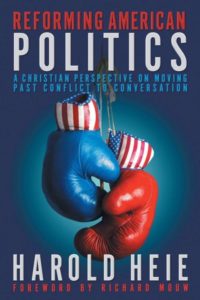 Reforming American Politics: A Christian Perspective on Moving Past Conflict to Conversation Harold Heie (Read the Spirit) $24.99 Sorry, no discount on items from this publisher. I am very fond of this very interesting book and want to highly recommend it because it does two or three important things. I suppose the project it foregrounds is firstly to teach us to be civil in our discussions, even our on-line debates. Secondly, it helps us develop –by walking through a series of reports about on-line debates and evaluating their civility – a consistently Christian vision for and perspective on government and politics and citizenship.
Reforming American Politics: A Christian Perspective on Moving Past Conflict to Conversation Harold Heie (Read the Spirit) $24.99 Sorry, no discount on items from this publisher. I am very fond of this very interesting book and want to highly recommend it because it does two or three important things. I suppose the project it foregrounds is firstly to teach us to be civil in our discussions, even our on-line debates. Secondly, it helps us develop –by walking through a series of reports about on-line debates and evaluating their civility – a consistently Christian vision for and perspective on government and politics and citizenship.
So this is a twofer kind of book. You will learn the art of conflict resolution using tools of conviviality, compromise, collaboration, and nuance, even as you are invited to actually ponder what a truly Christian viewpoint might be on various social and public policy issues. You can see why this is the “big ending” to this BookNotes newsletter on Biblically-grounded Christian politics and the gracious practices of convicted civility. It’s all here!
Dr. Harold Heie has spent a lifetime as an institutional peacemaker. He has worked at Christian colleges and universities and has written about their project of integrating faith and scholarship, which (as you might expect) has brought conflict to nearly every department of nearly every Christian college in the land. If one starts saying that this scholar or that viewpoint in science or art history or economics or psychology is more Christian or less Christian than another, even the most devout Christian scholar will feel attacked or accused of compromise. Over the last several decades there have been debates (often civil, but sometimes not, I gather) about what it actually looks like to relate Biblical faith to Christian scholarship across the curriculum and departments. I have been party to conversations at Christian institutions of higher learning where some have said the very project of developing some theory of Christian scholarship in business or counseling or engineering is itself unnecessary. So the debates have been hurtful as otherwise devoted church people in various scholarly fields have debated this or that school of thought, asking if it is faithful to be aligned with this movement or set of ideas in the academy. (Just think, for example, of the robust discussions about origins and creationism, intelligent design, Darwinism, and such. Or the debates about so-called Biblical vs. Christian counseling. Or the discussions about whether Biblical teaching is congenial to or opposed to free market capitalism, say. What should we think about scholars who draw uncritically upon Marx and Freud and Derrida, after all? Heck, I’ve seen fights break out over lesser things.)
And, again, to give the context of Heie’s experience and expertise, just add to this mix of conflict in higher eduction the struggles of what a faithful sort of student affairs department might look like, what co-curricular activities Christian colleges should propose, what kind of engagement with the popular arts — rock? hip-cop? — the roles of race and gender within our institutions, ponder what it looks like to be faithful and hospitable to LGTBQ students and/or faculty and other explosive, human issues, and you can imagine that those navigating these areas of cultural and theological conflict become either wizened or jaded, adept and peace-making among differences or hardened or burned out. Anyone who is an institutional leader knows some of this.
I mention all this to say that Heie has written books about peacemaking within the context of Christian higher education and that he has learned a lot. He has been both scarred and wizened and is now a master at this sort of conflict management among differences.
Reforming American Politics is the fruit of an on-line research project Heie developed that – to put it a bit too simply, I fear – invited conversation partners (from within the Christian tradition) to debate various policy questions on line. For this book, then, he interviewed the participants, asking how they felt when this person said that, or that statement was made or that assertion challenged or ignored. It isn’t just a tedious play-by-play dissection of these on-line discussions, but it does offer good summaries and what might be learned by evaluating how the debates unfolded.
Fascinating, huh? I don’t know why any one hasn’t thought of this before. Writing a book about deeper conversations by observing conversations on line, which he called eCircles — even Parker Palmer didn’t think of that! — is brilliant, isn’t it?
Again, his intention seems two-fold. He is firstly asking us how we can engage in on-line (and face-to-face) discourse without getting ugly, and how to better comport ourselves in the middle of heated exchanges. He’s a peace-maker and his guidance on best practices for civility is very helpful, especially as it relates to politically charged discussions.
And secondly, Heie helps the participants and interlocutors come to some conclusions about presuppositions and principles that shape policies. Which arguments are fair and which are non sequiturs and which are straw men and which have Biblical substance; what proposals are right and good and what makes them compelling? Which are sustainable in light of the real world of contemporary politics? Heie, for what it is worth, has served at a Board member one of our favorite political organizations, The Center for Public Justice and this book has a very fine foreword by like-minded civility leader and Christian political thinker Richard Mouw.
Reforming American Politics: A Christian Perspective on Moving Past Conflict to Conversation asks if we can reach some conclusions not only about how to be pleasant and fair in our discourse, but actually reach some common ground on what a Christian view of politics might actually be? And if not, can we agree to disagree with some sort of fidelity and grace?
I mentioned Mark Noll, the esteemed evangelical historian, who endorsed one of the previous books, above. Noll says “It is hard to imagine a better book for times like these…” He continues:
In an age of flaming rhetoric, fractious politics and fissiparous ideology, Harold Heie exemplifies a much better way. The discussions he moderates in this book treat red-hot issues like immigration, health care, economic inequality and money in politics … The marvel for readers will be to see believers airing their differences frankly, but doing so with Christian friendship preserved and Christian wisdom to the forefront.
You see, this book nearly brings us back where we started. We simply must deal with our bad habits of debating poorly and being inappropriate in our hostile partisanship. We’ve got to learn (I’m speaking to myself, too, here) the ways of humility and kindness even within robust discussions about our current affairs. But also, as we talk about politics, as Christians, at least, we cannot sidestep our call to be faithful, theologically informed, Biblically-shaped in what we think of and wish for in our political views. We need to love like Jesus, sure, but we also have to have the mind of Christ.
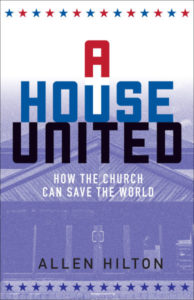 A House United: How the Church Can Save the World Allen Hilton (Fortress) $16.99 I reviewed this at greater length in a BookNotes last fall. I highlighted it in a column I did for the Center for Public Justice, in fact. Even though it isn’t brand new, I have to list it here. I’ll admit that at first I wasn’t so sure about the title and premise — can the church save the world? But what Hilton means is powerful and poignant, and, frankly, exceedingly practical. In a nutshell, his common sense (but explored with helpful theological substance) argument is this: we cannot help heal the culture wars in our civic spaces until we within the Body of Christ (at least!) learn to respect one another. There are huge theological and ethical differences within various denominations (and even within our own congregations.) Sometimes, we allow our worldly dispositions and partisan political loyalties to trump our affection for our brothers and sisters within the one body of Christ. There may be no more practical and urgent starting point for our efforts to heal the fallout from the cultural wars than for people of faith to love one another. (Sounds a bit like John 13, doesn’t it?)
A House United: How the Church Can Save the World Allen Hilton (Fortress) $16.99 I reviewed this at greater length in a BookNotes last fall. I highlighted it in a column I did for the Center for Public Justice, in fact. Even though it isn’t brand new, I have to list it here. I’ll admit that at first I wasn’t so sure about the title and premise — can the church save the world? But what Hilton means is powerful and poignant, and, frankly, exceedingly practical. In a nutshell, his common sense (but explored with helpful theological substance) argument is this: we cannot help heal the culture wars in our civic spaces until we within the Body of Christ (at least!) learn to respect one another. There are huge theological and ethical differences within various denominations (and even within our own congregations.) Sometimes, we allow our worldly dispositions and partisan political loyalties to trump our affection for our brothers and sisters within the one body of Christ. There may be no more practical and urgent starting point for our efforts to heal the fallout from the cultural wars than for people of faith to love one another. (Sounds a bit like John 13, doesn’t it?)
But here is part of the brilliance of A House United. The author does not expect us to leave all of our political beliefs at the door of the church. We don’t have to all agree! In fact, the gospel of grace and the vision of reconciliation seem to imply disagreement. We should find unity within diversity.
Richard Mouw in Uncommon Decency reminds us that it is fairly easy to be civil with those with whom you agree. And it is easy to be civil if you don’t really have any strong convictions. The goal is to develop the art or spiritual gift of “convicted civility” where we can be gracious especially when we disagree. I think A House United by Allen Hilton could help us get there. May it be so.
All of these books (except where noted) are 20% off of the regular retail price. Our order form page is certified secure and you can order any of these books today. Thanks for caring, thanks for your support.
BookNotes

SPECIAL
DISCOUNT
20% OFF
ANY BOOK MENTIONED
[[except the one noted as mentioned above]]
+++
order here
this takes you to the secure Hearts & Minds order form page
just tell us what you want
inquire here
if you have questions or need more information
just ask us what you want to know
Hearts & Minds 234 East Main Street Dallastown PA 17313
read@heartsandmindsbooks.com
717-246-3333
